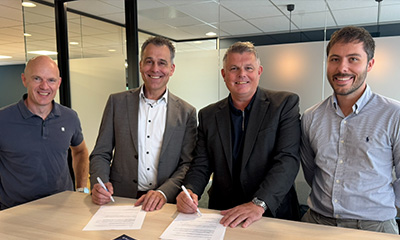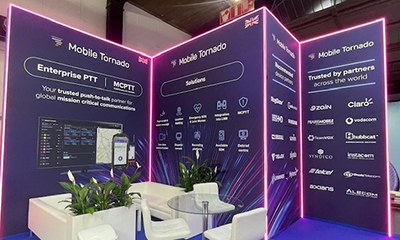In this Q&A, Andrew McNamara, Head of Strategic Partnerships at Mobile Tornado, talks about the changing market for critical communications and how push-to-talk over cellular is going mainstream.
How has the market changed in recent years?
There’s a growing acceptance of push-to-talk now. The Software has come of age. Even 12 months ago, there was still some reluctance to engage but that has diminished.
Through our collaboration with network providers such as Ericsson, we are seeing different types of businesses looking at push-to-talk in sectors such as oil and gas, airports and manufacturing. Organisations want to streamline how they communicate. Push-to-talk is here to stay and will continue to grow.
Here at Mobile Tornado we are continually investing in research and development and expanding our software capabilities which further increases the credibility of PTT. Mobile network providers say they need to partner with push-to-talk vendors because their enterprise customers are demanding these technologies. Customers want to empower their workforces with instant communications.
The partnerships that we and our resellers forge with specialist multi-network SIM providers provide high availability coverage over multiple networks. It’s like express check-in at an airport. You don’t have to queue with everyone else.
Why is the market growing?
Nowadays, there is widespread acceptance about using an application.
The customers deploying the solution don’t need radio experience because it’s just a simple process of giving access to the application via a web based provisioning portal. Most customers rely on their IT department to activate the application so initiating on a web-based platform with thousands of users is very easy.
To do that with traditional two-way radios is very time consuming and expensive. You need somebody to program each radio and if a radio is turned off, it doesn’t always pick up the updates.
There are myriad problems with large-scale deployments of two-way radios. What’s more, the cost of infrastructure is prohibitive too. For systems in oil and gas fields or large-scale manufacturing, push-to-talk wins on costs. There are no infrastructure costs so the only capital expenditure is the device.
Can you tell us about some of your new software features?
When you look at what we can do on our platform on a multi-functional device, PTToC is a no brainer. Recently we’ve developed HD Audio which delivers clearer audio to the end user. To have the same voice quality with two-way radios, you’d need to invest in a Tetra network, which is majorly expensive.
As well as group and one-to-one calls, we have fully integrated lone worker capability, a camera that opens up in case of emergency, multi-media messaging that can send PDFs, Excel documents and voice and video notes, all in one application and on one device. It’s simple to navigate and very user friendly – after all, everyone uses an Android or iOS smartphone!. .
How are instant communications transforming business operations?
As the name suggests, Instant Group communications allows businesses to have instant communications with up to 5000 individuals. This gives organisations the ability to influence any delays or incidents which occur, increasing efficiencies and saving money in lost time etc.
Take logistics as one example. Nowadays, a delivery driver doesn’t ask a customer to sign a piece of paper when he hands over a parcel. He confirms their name, enters it into his device and takes a picture of the customer holding the parcel. It’s instant communication in action!.
In the utilities sector, A supervisor can receive an instant notification that their engineer is on site and the engineer can film what’s wrong with the boiler and send it to his/her supervisor. The supervisor can open up the camera on the engineer’s device from the dispatch console and see live what the operative is doing.
A smartphone becomes a radio, a camera, a scanner and a PDA device. The cost savings are dramatic.
What is your favorite feedback from a user?
A few months ago we donated licences to Search and Rescue Lincolnshire, a charity which operates across England’s second largest county and works with the police and other agencies to locate missing persons. Following violent storms, search and rescue volunteers evacuated vulnerable people and their pets from flooded homes with our help.
Paul Woodman, chief executive at Search and Rescue Lincolnshire, said: “Mobile Tornado has been absolutely invaluable for emergency teams to stay in touch. We are able to see the location of our volunteers, communicate with them in an instant and record everything we do across a wide area. Previously, we relied on legacy radio systems which had a limited range and were restricted to line of sight. Mobile Tornado enables us to have county-wide communications without having to purchase very expensive radio equipment. For strategic, intergroup and long-distance communications, it is absolutely great.”
Is it possible to integrate two-way radios with PTToC systems?
As much as we would like users to move from two-way radios to push-to-talk, a lot of organisations have made large investments in legacy systems.
For legacy radio users wishing to either trial or introduce PTToC technology a standalone Radio over IP (RoIP) is a cost effective and easy-to-install way to integrate two-way radio systems with PTT radios and smartphones.
It gives you the combination of two-way radio and push-to-talk, either as a hybrid solution or pathway away from legacy infrastructure.
We are seeing a lot of interest in this approach among large manufacturers in Europe.
Where is the market heading?
The fact that mobile network operators want to offer push-to-talk to their enterprise customers underlines the massive growth potential of our technologies. Many operators have a relationship with a push-to-talk provider. The market is changing very quickly with the development of private 5G and 4G networks and specialist multi-network SIM providers giving you access to servers even when networks are congested.
People have woken up to push-to-talk and PTToC is going mainstream.
To get in touch with Mobile Tornado, drop us a line via sa***@mo***********.com




